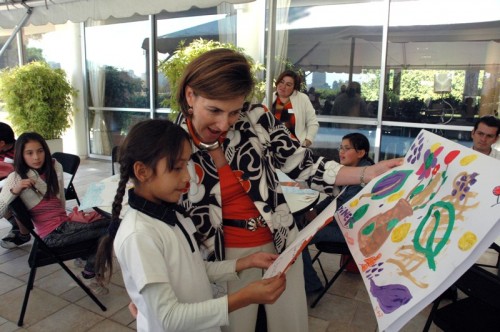How To Prepare for Volunteer Teaching in Chile

Many thanks to Allie, a guest writer and volunteer English Teacher with the English Opens Doors program in Chile.
I remember seeing 20 teenage faces staring back at me. Slowly, whispers of “No cachai,” Chilean slang for “I don’t get it” rippled throughout the classroom. It suddenly dawned on me that nobody could understand my basic English. This wasn’t covered in the orientation, I thought.
That’s because the bulk of the English Open Doors Program’s orientation is about lesson planning.
The first week in Santiago is a solid crash-course in how to plan activities and run an efficient classroom. For two full days, you create mock lesson plans and present them to your peers for feedback. You also brainstorm ideas of how to deal with different student behavior problems.
Since the English Opens Doors program doesn’t require a TEFL certificate, the orientation is a nice overview of best teaching practices. It gives you the confidence to walk into class on your first day.
However, after talking with many other volunteers, we realized that the first week didn’t cover some of the most common issues we’ve encountered during our time here.
Here are three things to keep in mind while preparing for volunteer teaching in Chile:
English levels are very low
Let me repeat that: Students English levels are very, very low.
A question such as, “How are you?” sometimes won’t even draw a response from high schoolers. This stark communication barrier catches many volunteers off guard.
The orientation in Santiago will prep you for crafting lessons, but you’ll soon realize that your grand ideas might not work once you set foot inside a Chilean classroom.
The best way to work around this challenge is find out your students’ interests right away. What soccer teams are they crazy about? What movies do they like? Take a class survey during your first few days to get an idea.
The classroom atmosphere is very lax
The way a Chilean school functions is very different from what many volunteers are used to in their home countries, where the bell rings and the teacher starts the lesson. Not so much here.
Constant chatting, cell phone use, and disruption is fairly normal, and to some degree, even tolerated. Don’t be frazzled if you think you’re losing control of your class. (You probably aren’t.) This is just the way things are in Chile.
However, classroom management is still important, so here are some things I’ve learned to help run a smoother class:
-Don’t talk over your students. From day one, create a signal that means you want silence. It could be holding up your hand or clapping three times. Whatever it is, make it consistent.
-Brush up on your Spanish. If managing a class isn’t tough enough, speaking to students who don’t understand you makes things more challenging. Make sure you know some basic phrases in Spanish to help keep things in line. Common classroom instructions such as, “Now we’re going to draw/write/play a game, get into teams, etc”, will come in handy when you need to get your point across quickly.
Culture shock
Whether it’s for four months or a year, you’re bound to run into it while teaching abroad.
While the English Opens Doors orientation dedicates a day to going over Chilean customs, it doesn’t touch on how to cope with your own feelings of isolation or culture shock while adjusting to your new life abroad.
You may be the only volunteer in your town, and it’s important to know how to cope with this, while still immersing yourself in the local community. The best advice is to reach out to other volunteers around you. Ask your regional representative if it’s possible to put you in contact with volunteers who are already living in your assigned region. This is something we wished the program had done at orientation, since it can help foster a stronger volunteer community.
The motto of the English Opens Doors orientation is, “Be flexible.”
Independence, a willingness to adapt, and a sense of humor are the key ingredients to a successful and fun time in Chile. An awareness of the above points will help prepare you for this amazing and life-changing experience.
As one of the staff told us at orientation, this may just be the greatest experience of your life.




2 Responses
Hello,
Do you offer volunteer esl positions in China or Thailand?
I am very interested in your program. I have taught for
three years in Korea, Taiwan and China and would like
to return to teach.
Thank you,
Max S Kissell
Hi Max,
We only have volunteer positions in Georgia and Chile. Please visit our website to learn more about each program.